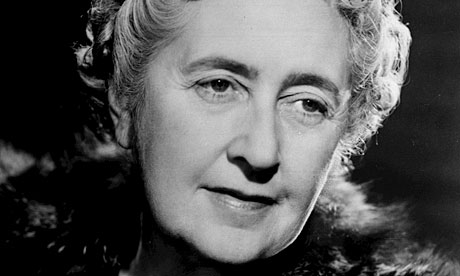A blog for lovers of pocket novels written by a group of authors who are: Kate Allan, Cara Cooper, Fay Cunningham, Noelene Jenkinson, Patricia Keyson, Chrissie Loveday, Carol MacLean, Fenella Miller, Margaret Mounsdon and Sally Quilford
Monday, 3 December 2012
Advent Heroines Day Three
My first advent heroine is the incomparable Dame Agatha Christie. As a writer of romantic suspense, I've studied her books closely to try to find out what it is that makes them so good. Yes, I know Agatha was a crime writer, but there was often a bit of romantic intrigue at the centre of her novels (and she did write romantic novels as Mary Westmacott), such as The Man In The Brown Suit, and the Tommy and Tuppence novels. At least two of my novellas, My True Companion and A Collector of Hearts, are inspired by Agatha's work, and my town of Midchester is not so different from St. Mary Mead, though I have set my stories in Midchester in modern times as well as historical.
One thing reading Agatha's work teaches me personally is how to write easy prose that drives the story along. As I'm sure any of my fellow Pocketeers can verify, easy reading is hard writing. It's not at all easy to write prose that is simple, but effective. Agatha Christie was the mistress of the technique and there was a study done once on why her work was so popular. It was because she used phrases that people instantly recognised (scroll down to where it says 'Her language and The Agatha Christie code). That is why her books sold so many, along with the fact that as a writer she was innovative and not afraid to take chances, as The Murder of Roger Ackroyd shows. So I strive to make my stories move along at a similar pace, in the hopes that the reader will just keep turning the pages.
Christie was something of a mystery woman herself. When her husband, Archie Christie, said he was leaving her for another woman, she disappeared for 11 days, and turned up in a Harrogate hotel, where she was using the surname of her husband's mistress (Neele). No one ever knew why she did it, though it's been suggested that she just wanted to embarrass her husband. Either way, I love that this wonderful writer of mysteries created her own mystery, and never spoke about it.
In a Doctor Who episode, it was suggested that Agatha's novels will be read many millions of years into the future and I doubt anyone would disagree. As I toast my advent heroine, I can only wish mine achieve the same status.
Subscribe to:
Post Comments (Atom)

Just love Agatha Christie and mysteries of many kinds.
ReplyDeleteMe too, Patricia!
ReplyDeleteSame here
ReplyDeleteThat's really interesting about the recognisable phrases Agatha used. Do you have an example? Love the fact she wrote some romance in amongst the crime. Real life is often like that, so it makes a lot of sense.
ReplyDeleteI think they were what we might call hackneyed phrases, Antonia. I didn't have time to search earlier as I was in a hurry to put this post up before it was too late. But I've just found this, as I couldn't find the original study I read. Scroll down to where it talks about her use of language and 'The Agatha Christie' code: http://www.christiemystery.co.uk/method.html
ReplyDeleteFascinating post Sally. I've only ever tried her books once or twice and found there were too many characters for me although reading the Code I can see that for some people getting lost in all of it is part of the attraction. I may well try her again some time!
DeleteMany murder mysteries have a lot of characters, and I tend to use quite a lot in my books too. I think it makes it harder to pin down the culprit when there are more people.
DeleteIt means juggling a lot of balls in the air at once, whilst still keeping the story understandable. I don't pretend to do it as well as Agatha does but I do enjoy trying to do it.
She defined a genre - inspirational!
ReplyDeleteShe certainly did, Womag! I can read and re-read her books over and over again, even when I know who the murderer is.
DeleteWow! Just read it, Sally. Very interesting.
ReplyDeleteYes, Antonia, I thought so too. I think what it comes down to is that she didn't talk down to people. She used ordinary every day language and didn't try to set herself apart from her readers.
DeleteYes, I see what you mean, Sally. It's certainly worked for her.
DeleteI absolutely love Agatha Christie. There's a really good book about her novels by Robert Barnard called A Talent To Deceive, which evaluates each one.
ReplyDeleteThat sounds interesting, Helen. I'll have to see if I can get that.
DeleteThanks, Helen. I might try to get that myself.
DeleteAgatha Christie's work has been derided by many as stereotyped and hackneyed, but there must be something in it, as she just goes on and on. I find her books an easy read, and I once read one of her Mary Westmacott books and was surprised at how good the story was.
ReplyDeleteI think her work only seems stereotyped and hackneyed to us, Jeannie, because so many have followed her example. When I'm not in the mood for anything too challenging, but still want an enjoyable read, I always turn to Agatha.
DeleteYes, Sally, I meant *her detractors* accused her of being stereotyped and hackneyed. And cliches have only become cliches because they were copied. Aggie often got there first and was copied by others.
ReplyDeleteThat's very true!
Delete